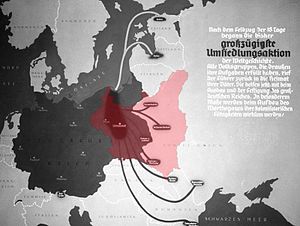
Back هايم إنس رايخ Arabic Heim ins Reich Azerbaijani Heim ins Reich Bulgarian Heim ins Reich Czech Heim ins Reich German Heim ins Reich Spanish هایم اینس رایش Persian Heim ins Reich French Heim ins Reich ID Heim ins Reich Italian
| Home to the Reich | |
 Nazi Germany in 1939 (dark grey) after the conquest of Poland; with pockets of German colonists brought into the annexed territories of Poland from the Soviet "sphere of influence". – Nazi propaganda poster superimposed with the red outline of Poland missing entirely from the original print.[1] | |
| Duration | 1938–1944 |
|---|---|
| Location | Territories controlled by Nazi Germany |
| Type | Ethnic cleansing and population transfer |
| Cause | Lebensraum, Generalplan Ost |
| Patron(s) | Adolf Hitler |
The Heim ins Reich (German pronunciation: [ˈhaɪm ʔɪns ˈʁaɪç] ; meaning "back home to the Reich") was a foreign policy pursued by Adolf Hitler before and during World War II, beginning in 1936 [see Nazi Four Year Plan; Grams, 2021]. The aim of Hitler's initiative was to convince all Volksdeutsche (ethnic Germans) who were living outside Nazi Germany (e.g. in Austria, Czechoslovakia and the western districts of Poland) that they should strive to bring these regions "home" into Greater Germany, but also relocate from territories that were not under German control, following the conquest of Poland, in accordance with the Nazi–Soviet pact.[2] The Heim ins Reich manifesto targeted areas ceded in Versailles to the newly reborn state of Poland, various lands of immigration, as well as other areas that were inhabited by significant ethnic German populations, such as the Sudetenland, Danzig (now Gdansk), and the southeastern and northeastern regions of Europe after 6 October 1939.
Implementation of the policy was managed by VOMI (Hauptamt Volksdeutsche Mittelstelle or "Main Welfare Office for Ethnic Germans"). As a state agency of the NSDAP, it handled all Volksdeutsche issues. By 1941, the VOMI was under the control of the SS.[3]
- ^ Cite error: The named reference
Nicwas invoked but never defined (see the help page). - ^ Cite error: The named reference
Tesserwas invoked but never defined (see the help page). - ^ Douglas, R. M. (2012). Orderly and Humane: The Expulsion of the Germans after the Second World War. Yale University Press. p. 21. ISBN 978-0300183764.
In a keynote address to the Reichstag to mark the end of the 'Polish campaign', Hitler announced on October 6, 1939 ... the Heim ins Reich (Back to the Reich) program. The prospect horrified many ethnic Germans, much of whose enthusiasm for Nazism had been predicated on the expectation that the boundaries of the Reich would, as in the cases of Austria, the Sudetenland, and Danzig, extend to embrace them. The prospect of being uprooted from their homes to face an uncertain future not even in Germany proper, but in the considerably less salubrious environment of western Poland, was much less attractive. So far from rallying enthusiastically to the Führer's call, therefore, many Volksdeutsche greeted the declaration of the Heim in Reich initiative with a deep sense of betrayal.